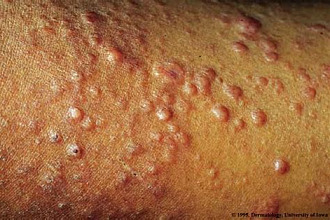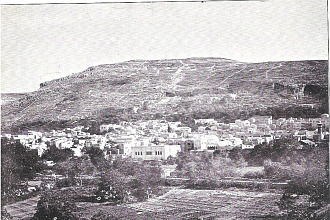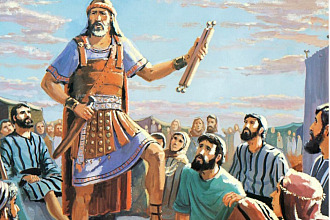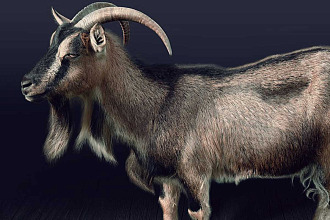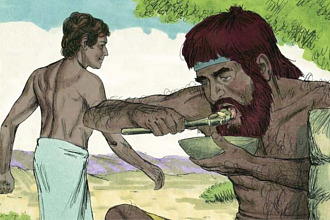Parasha for the Week: Vayechi: Genesis 47:28 - 50:26.
Haftarah for the Week: 1 Kings 2:1 - 12.
Besorat Yeshua: Mark 13:32 - 14:9.
Overview
Yaakov senses his days drawing to a close and summons Yosef.
He has Yosef swear to bury him in the Machpela Cave, the burial place of Avraham and Sara, Yitzchak and Rivka.
Yaakov falls ill, and Yosef brings to him his two sons, Ephraim and Menashe. Yaakov elevates Ephraim and Menashe to the status of his own sons, thus giving Yosef a double portion that removes the status of firstborn from Reuven.
As Yaakov is blind from old age, Yosef leads his sons close to their grandfather. Yaakov kisses and hugs them. He had not thought to see his son Yosef again, let alone Yosef's children.
Yaakov begins to bless them, giving precedence to Ephraim, the younger, but Yosef interrupts him and indicates that Menashe is the elder.
According to the Jewish tradition, Yaakov explains that he intends to bless Ephraim with his strong hand because Yehoshua will descend from him, and Yehoshua will be both the conqueror of Eretz Yisrael and the teacher of Torah to the Jewish People.
Yaakov summons the rest of his sons in order to bless them as well. Yaakov's blessing reflects the unique character and ability of each tribe, in its unique mission in serving G-d.
Yaakov passes away at age 147. A tremendous procession accompanies his funeral cortege up from Egypt to his resting place in the Cave of Machpela in Chevron.
After Yaakov's passing, the brothers are concerned that Yosef will now take revenge on them. Yosef reassures them, even promising to support them and their families.
Yosef lives out the rest of his years in Egypt, seeing Efraim's great-grandchildren. Before his death, Yosef foretells to his brothers that G-d will redeem them from Egypt. He makes them swear to bring his bones out of Egypt with them at that time.
Yosef passes away at the age of 110 and is embalmed. Thus ends Sefer Bereishet, the first of the five Books of the Torah.
Children's Blessings
There is a Jewish tradition for parents to bless their children at special occasions. The source for the boys’ blessing is in this week's Parasha, Vayechi.
The traditional blessing for boys is, "Y'simcha Elo-him K'Ephrayim V'kimnashe—"May G-d make you like Ephrayim and Menashe."
The blessing to girls is, "Yesimaich Elo-him K'Sarah, Rivkah, Rachel, V'Leah"—"May G-d make you like Sarah, Rivkah, Rachel and Leah."
When Joseph brought his two sons, Menashe and Ephraim, to be blessed by their grandfather, Yaakov kissed and embraced them, and said to Joseph, "I didn't think I would see your face and now, G-d let me see also your children." Yaakov's fondness and admiration for these two grandchildren is clearly seen in the Parasha. In addition to giving Menashe and Ephraim special blessings, Yaakov appoints each as the head of a tribe in Israel. Menashe and Ephraim are Yaakov's only grandchildren to merit becoming heads of tribes. In addition, Yaakov proclaims, "By these shall Israel bless saying, 'May G-d make you as Ephraim and as Menashe.'" Jewish parents have used this phrase to bless their sons for thousands of years.
How Do We Measure Life?
While the life of Abraham and Yitzchak take up four Parshiot (Lech Lecha, Vayeira, Chayei Sarah, Toldot), Yaakov takes up seven Parshiot (Toldot, Vayeitzei, Vayishlach, Vayeishev, Mikeitz, Vayigash, Vayechi). Yet, Yaakov's life was the shortest. Abraham lived 175 years; Yitzchak 180; while Yaakov lived 147 years. Abraham's son Yishmael and his descendants departed from Abraham's ways. Similarly, Yitzchak's son Esau and his descendants strayed from the teachings of Yitzchak. Yaakov was the only one of the patriarchs whose children all followed in their father's tradition. Thus, our sages say, "Yaakov didn't die. For as long as his children are alive [continuing his ways] he too is alive." In other words, true life is not measured by the length of one's days. It is measured by the values one lives by and the ability to transmit these values to future generations.
Quality of Life
Like his father, Joseph also asked to be buried in Israel. But contrary to his father, who was carried back to Israel soon after his death, Joseph's body stayed in Egypt until the Exodus when the entire Jewish people left Egypt. Joseph was sold into slavery and brought to Egypt, the most immoral culture of its time. He spent many years exposed to the Egyptian culture. He spent years in an Egyptian prison. Yet he ultimately became the ruler of the land of Egypt and saved the people from starvation. The Torah describes his life story in great length and in great detail. One's life is not necessarily measured in quantity, but rather in quality.
Bikur Cholim
The first time that the Torah mentions sickness is in this week's Parasha, Vayechi.
In the beginning of the Parsha, the Torah tells us that Joseph is told "Behold your father is sick." Visiting the sick is a great mitzvah. This mitzvah is called "Bikur Cholim." Our sages state that by performing this mitzvah, a person "enjoys its fruits-reward in this world while the principal reward remains intact in the World-to-Come." Visiting the sick has many purposes: to lift their spirits and thus help them overcome their illness; to see if there is anything they need; also, so that we will pray for their recovery. We are blessed as we appreciate health more; we are serving as God's hands and feet, and we are encouraged as we see others encouraged.
HAFTARAH 1 Kings 2:1 – 12
Parasha: Yaakov was dying and gave his last instructions to Yosef and other sons: [Yaakov] blessed Joseph, and said, "The God before whom my ancestors Abraham and Isaac walked, the God who has been my shepherd all my life to this day, the angel who has redeemed me from all harm, bless the boys; and in them let my name be perpetuated, and the name of my ancestors Abraham and Isaac; and let them grow into a multitude on the earth" (Gen. 48:15-16).
Haftarah: The Jewish tradition has made a parallel between Yaakov dying and King David dying and giving instruction to Solomon his son: "When David's time to die drew near, he charged his son Solomon, saying: "I am about to go the way of all the earth. Be strong, be courageous, and keep the charge of the LORD your God, walking in his ways and keeping his statutes, his commandments, his ordinances, and his testimonies, as it is written in the law of Moses, so that you may prosper in all that you do and wherever you turn. Then the LORD will establish his word that he spoke concerning me: 'If your heirs take heed to their way, to walk before me in faithfulness with all their heart and with all their soul, there shall not fail you a successor on the throne of Israel.’ Moreover you know also what Joab son of Zeruiah did to me, how he dealt with the two commanders of the armies of Israel, Abner son of Ner, and Amasa son of Jether, whom he murdered, retaliating in time of peace for blood that had been shed in war, and putting the blood of war on the belt around his waist, and on the sandals on his feet. Act therefore according to your wisdom, but do not let his gray head go down to Sheol in peace. Deal loyally, however, with the sons of Barzillai the Gileadite, and let them be among those who eat at your table; for with such loyalty they met me when I fled from your brother Absalom . . . . I swore to him by the LORD, 'I will not put you to death with the sword.' Therefore do not hold him guiltless, for you are a wise man; you will know what you ought to do to him, and you must bring his gray head down with blood to Sheol. Then David slept with his ancestors, and was buried in the city of David."
Besorat Yeshua Mark 13:32 - 14:9.
Parasha: Yaakov is dying, "Now the eyes of Israel were dim with age, and he could not see well. So Joseph brought them near him; and he kissed them and embraced them " (Gen 48:10).
Besorah: In the parasha Yaakov, just before dying gave a prophecy about the future of God's people through his sons. Yeshua does the same; he will die very soon, and he gave a prophecy for the future of his people: "It is like a man going on a journey, when he leaves home and puts his slaves in charge, each with his work, and commands the doorkeeper to be on the watch. Therefore, keep awake—for you do not know when the master of the house will come, in the evening, or at midnight, or at cockcrow, or at dawn, or else he may find you asleep when he comes suddenly. And what I say to you I say to all: Keep awake."
In the parasha, Yosef demonstrated kindness to his brothers even after the death of his father. There is a woman in the text of the Besorah who demonstrated kindness to Yeshua before he dies. Her name was Myriam, and she lived in Bethany a small village near Yerushaleem. "While he was at Bethany in the house of Simon the leper, as he sat at the table, a woman came with an alabaster jar of very costly ointment of nard, and she broke open the jar and poured the ointment on his head . . . . But Yeshua said, "Let her alone; why do you trouble her? She has performed a good service for me. For you always have the poor with you, and you can show kindness to them whenever you wish; but you will not always have me.”









